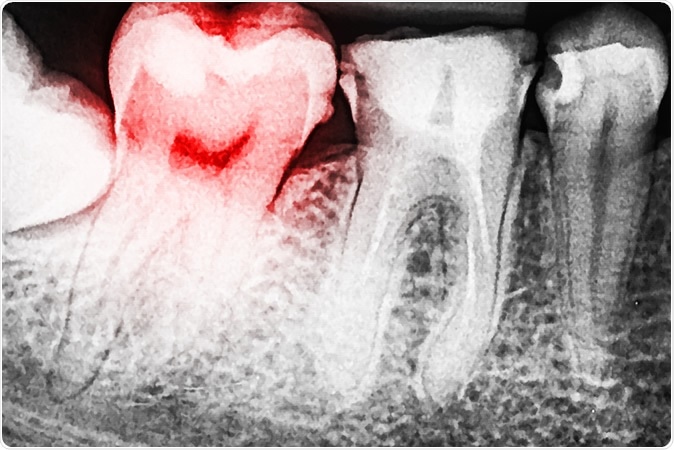Almost everyone experiences tooth decay (caries), it seems, making this among the most common conditions caused by bacterial infection. The costs of treating this condition are among the highest for bacterial conditions. However, the problem with treating dental decay is that it comes back again. Tel Aviv scientists have now discovered that certain novel materials have powerful antibacterial properties which can be harnessed in restorative dental fillings, to prevent recurrent tooth decay.

Tooth Decay. Image Credit: Radu Bercan / Shutterstock
When dental restoratives (fillings) are used to fill a tooth cavity, bacteria linger or lodge on the surface between the tooth and the filling material. They build in number, producing acid, and slowly dissolve the tooth material to produce more cavities around the margins of the filling. This is responsible for most recurrences of dental caries (secondary tooth decay). The ultimate outcome is root canal treatment and eventually the extraction of one or more teeth. The treatment of secondary tooth decay, which affects about 100 million people a year, costs more than $30 billion.
Dental restoratives were historically selected for their mechanical function, as well as capable of being molded to the right shape and size. They need to provide a continuous strong surface to the decayed teeth. The earliest materials for dental restoratives included amalgams, or mercury alloys, which had some antibacterial activity as well. However, the fact that their color makes them very noticeable, and the danger of mercury toxicity, as well as its relatively easy loosening from the dental cavity, prompted dentists to move on to other newer materials.
Currently, composite materials built on a resin foundation are the first choice as dental fillings. However, they lack any antibacterial activity. Newer biomedical materials are now making use of nanostructures based on novel peptides and amino acids.
In the current study, the team at Tel Aviv University addressed this drawback by successfully incorporating a modified amino acid molecule called fluorenylmethyloxycarbonyl (Fmoc)-pentafluoro-L-phenylalanine into a composite resin-based dental restorative. They were the first to discover the powerful antibacterial activity of this molecule. This building block has two parts, one part contributing structural integrity while the other part gives it its functional activity, and is capable of self-assembly at nanoscale.
The team discovered how to incorporate nano-assemblies of this material into the composite resin while retaining its intrinsic antibacterial activity. This makes the dental filling intrinsically resistant to bacterial attack, by inhibiting bacterial growth and making bacteria non-viable. This was confirmed by independent testing of the nanostructure-incorporated material for antibacterial activity. In addition, the low amount of the nano-assemblies that needs to be added means that the cosmetic and mechanical properties of the restorative are retained. The composite is also suitable for use within the human body without any toxic effect on body cells.
Study author Lee Schnaider says, “Resin composite fillings that display bacterial inhibitory activity have the potential to substantially hinder the development of this widespread oral disease. This work is a good example of the ways in which biophysical nanoscale characteristics affect the development of an enhanced biomedical material on a much larger scale. ”
The authors point out the many advantages of this dental restorative, such as the simple chemical structure of the antibacterial nanostructure which acts as the self-assembling building block, its excellent purity and cost-effectiveness, the simplicity of the incorporation process and the material’s compatibility with biological tissues. This makes it very suitable for the development of a commercially available dental filling material for clinical use. In fact, the researchers are now looking into other similar building blocks with antibacterial and self-assembling nature, which can be used to enhance the properties of other biomedical materials, such as those used to scaffold tissues during the process of repair, and in wound dressings.
Journal reference:
Lee Schnaider, Moumita Ghosh, Darya Bychenko, Irena Grigoriants, Sarah Ya’ari, Tamar Shalev Antsel, Shlomo Matalon, Rachel Sarig, Tamar Brosh, Raphael Pilo, Ehud Gazit, and Lihi Adler-Abramovich, Enhanced Nanoassembly-Incorporated Antibacterial Composite Materials, ACS Applied Materials & Interfaces 2019 11 (24), 21334-21342, DOI: 10.1021/acsami.9b02839, https://pubs.acs.org/doi/10.1021/acsami.9b02839